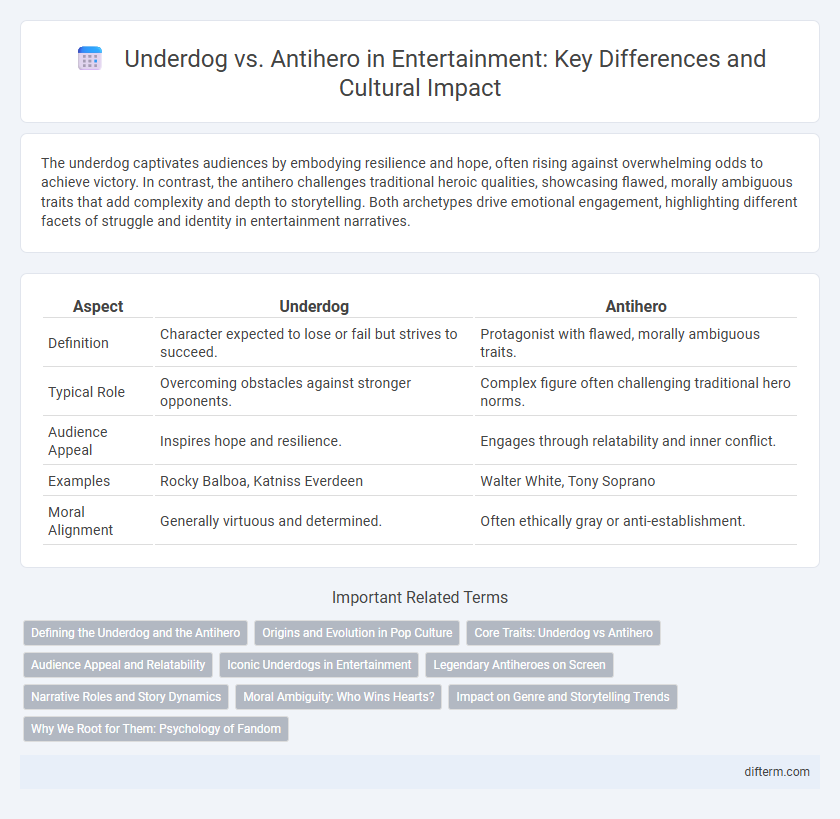The underdog captivates audiences by embodying resilience and hope, often rising against overwhelming odds to achieve victory. In contrast, the antihero challenges traditional heroic qualities, showcasing flawed, morally ambiguous traits that add complexity and depth to storytelling. Both archetypes drive emotional engagement, highlighting different facets of struggle and identity in entertainment narratives.
Table of Comparison
| Aspect | Underdog | Antihero |
|---|---|---|
| Definition | Character expected to lose or fail but strives to succeed. | Protagonist with flawed, morally ambiguous traits. |
| Typical Role | Overcoming obstacles against stronger opponents. | Complex figure often challenging traditional hero norms. |
| Audience Appeal | Inspires hope and resilience. | Engages through relatability and inner conflict. |
| Examples | Rocky Balboa, Katniss Everdeen | Walter White, Tony Soprano |
| Moral Alignment | Generally virtuous and determined. | Often ethically gray or anti-establishment. |
Defining the Underdog and the Antihero
The underdog is a character who faces significant obstacles and is often underestimated, embodying resilience and determination against powerful adversaries. The antihero, in contrast, lacks conventional heroic traits such as morality or idealism, presenting flawed, complex personalities that challenge traditional protagonist roles. Both archetypes drive compelling narratives by highlighting struggle and complexity, resonating deeply with audiences seeking relatable and dynamic characters.
Origins and Evolution in Pop Culture
Underdogs in entertainment often originate from humble beginnings, rising against adversity to achieve success, symbolizing hope and perseverance in pop culture narratives. Antiheroes, emerging prominently in the mid-20th century, challenge traditional heroism by embodying moral ambiguity and complex psychological traits, reflecting society's evolving views on morality. Their evolution highlights a shift from clear-cut good versus evil stories to nuanced character-driven tales in films, television, and literature.
Core Traits: Underdog vs Antihero
Underdogs are characterized by perseverance, resilience, and a strong moral compass, often facing overwhelming odds with determination and hope. Antiheroes exhibit complex traits like moral ambiguity, flawed ethics, and internal conflict, challenging traditional hero archetypes by blending virtue and vice. Both archetypes captivate audiences by evoking empathy through their relatable struggles and unconventional approaches to justice.
Audience Appeal and Relatability
Underdogs captivate audiences by embodying perseverance and hope, making their eventual triumphs deeply satisfying and relatable. Antiheroes attract viewers through their complex moral ambiguity, reflecting the imperfect nature of real human behavior and eliciting empathy despite flaws. Both character types resonate by offering distinct emotional connections--underdogs inspire aspiration, while antiheroes provoke introspection.
Iconic Underdogs in Entertainment
Iconic underdogs in entertainment often captivate audiences by overcoming overwhelming odds, exemplified by characters like Rocky Balboa from the "Rocky" series and Harry Potter from J.K. Rowling's novels. These underdog protagonists resonate deeply due to their relatable struggles and eventual triumphs, contrasting with antiheroes who frequently embrace moral ambiguity. The enduring appeal of underdogs lies in their embodiment of hope and resilience, inspiring viewers through stories of perseverance and unexpected victory.
Legendary Antiheroes on Screen
Legendary antiheroes on screen redefine traditional heroism by embodying complex moral ambiguity and flawed characteristics that resonate deeply with audiences. Characters like Walter White from "Breaking Bad," Tony Soprano from "The Sopranos," and Deadpool from the Marvel universe showcase the nuanced struggle between personal ambition and ethical boundaries. These iconic figures demonstrate that antiheroes often captivate viewers by challenging conventional narratives through their unpredictable, multifaceted personas.
Narrative Roles and Story Dynamics
Underdogs embody resilience and growth, often facing overwhelming odds that generate audience empathy and inspire emotional investment. Antiheroes blur moral lines through flawed, complex personalities, creating tension and unpredictable story dynamics that challenge conventional heroism. The interplay between underdog determination and antihero ambiguity deepens narrative engagement by balancing hope with realism.
Moral Ambiguity: Who Wins Hearts?
Underdogs often win hearts by embodying resilience and relatable vulnerability, inspiring audiences through their moral clarity and determination against overwhelming odds. Antiheroes captivate viewers with complex, flawed personalities and morally ambiguous decisions that challenge traditional notions of right and wrong. The tension between pure-hearted underdogs and ethically gray antiheroes creates rich narrative depth, drawing fans who appreciate both clear-cut virtues and nuanced character struggles.
Impact on Genre and Storytelling Trends
The underdog archetype drives narratives of hope and resilience, fueling genres like sports dramas and coming-of-age tales with emotional investment and audience empathy. Conversely, antiheroes introduce moral ambiguity and complexity, reshaping crime, thriller, and dark fantasy genres by challenging traditional heroism and deepening character development. These contrasting figures push storytelling trends toward multifaceted protagonists and nuanced conflict, broadening the scope of narrative exploration and audience engagement.
Why We Root for Them: Psychology of Fandom
Underdogs evoke empathy and hope by embodying resilience in the face of adversity, triggering a psychological reward system linked to overcoming challenges. Antiheroes captivate fans through their complex moral ambiguity, reflecting real human flaws and prompting deeper emotional engagement. Both archetypes satisfy intrinsic desires for justice and authenticity, fueling passionate fan loyalty and immersive storytelling.
underdog vs antihero Infographic

 difterm.com
difterm.com